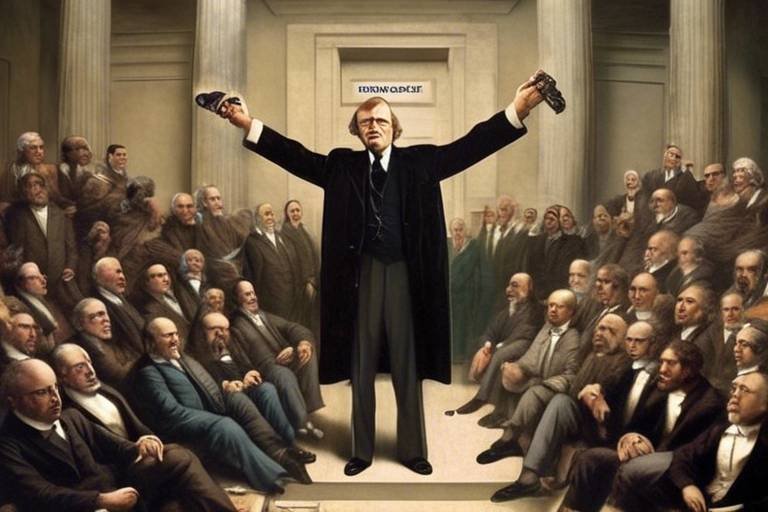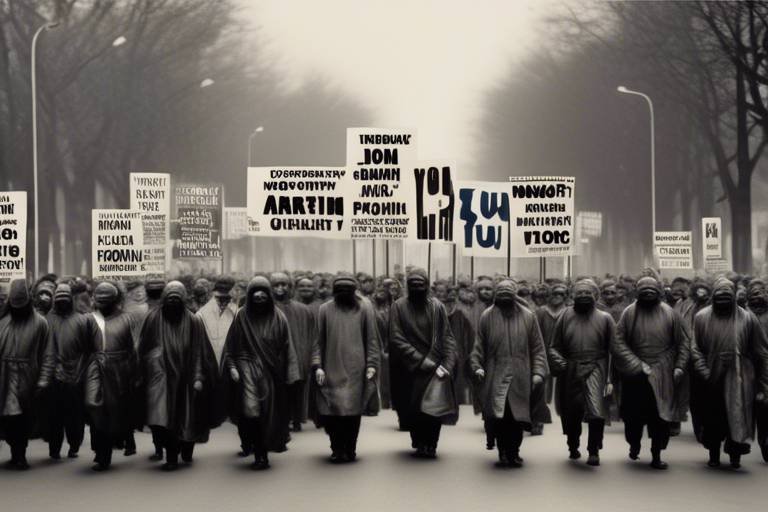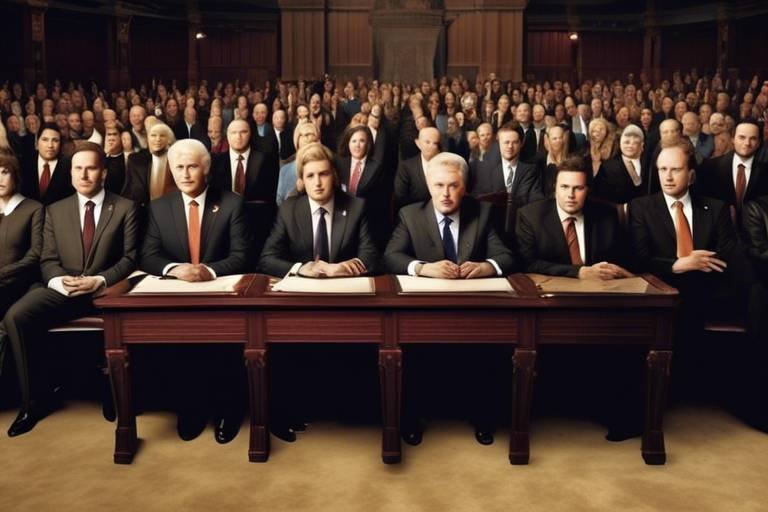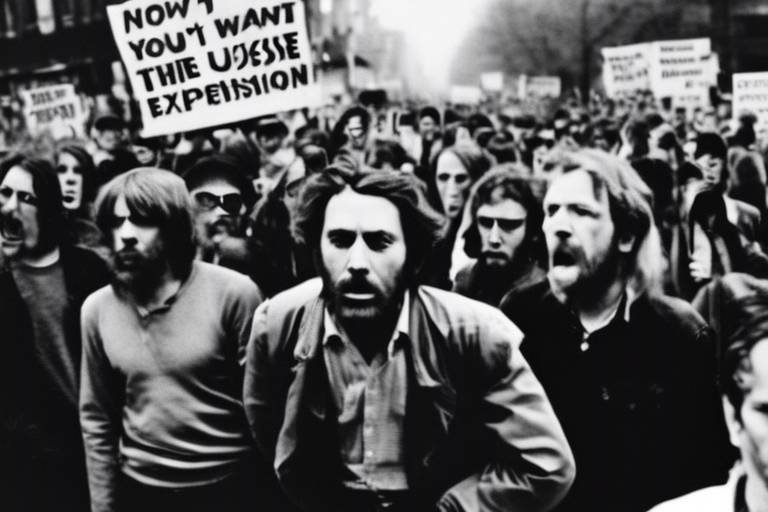The Politics of Nietzschean Philosophy
The interplay between philosophy and politics is a complex one, and when we delve into the realm of Nietzschean philosophy, we uncover a treasure trove of insights that challenge conventional political thought. Nietzsche, a provocative thinker, has shaped the way we view power, morality, and the very essence of human existence. His ideas resonate throughout contemporary political discourse, urging us to reconsider our values and the structures that govern society. In this article, we will explore how Nietzsche's concepts influence modern governance and societal dynamics, revealing the implications for both individuals and communities.
At the heart of Nietzsche's philosophy lies the notion of the will to power, a driving force that compels individuals to assert themselves and seek dominance. This idea transcends mere ambition; it encapsulates the fundamental human desire to grow, evolve, and create meaning in a world that often seems chaotic and indifferent. So, how does this will to power translate into political action? In essence, it becomes a tool for understanding the motivations behind political leaders and movements, as well as the societal structures they seek to influence. Nietzsche's vision challenges us to recognize that power dynamics are not merely about domination but also about the potential for transformation and innovation.
Moreover, Nietzsche introduces the concept of eternal recurrence, a thought experiment that invites us to consider the repetition of our lives in an infinite loop. Imagine living your life over and over again, with every joy and sorrow, triumph and failure repeating endlessly. This powerful idea compels us to evaluate our choices and the values we uphold. In political terms, it raises questions about the sustainability of our governance systems and societal norms. Are we creating a world we would willingly inhabit again and again? Or are we trapped in cycles of mediocrity, unable to break free from outdated ideologies?
Nietzsche also presents the figure of the Übermensch, or "Overman," as an ideal for humanity. This concept challenges us to transcend traditional moral frameworks and embrace a more individualized approach to ethics and governance. The Übermensch embodies the potential for self-overcoming and creative expression, pushing against the boundaries of societal constraints. In the political arena, this idea can inspire revolutionary movements that seek to dismantle oppressive structures and foster a more liberated society. But what does this mean for the average person? It suggests that we all have the capacity to become agents of change, capable of redefining our own values and influencing the world around us.
In summary, the politics of Nietzschean philosophy is not merely an academic exercise; it is a call to action. By engaging with Nietzsche's ideas, we can better understand the complexities of modern political thought and the challenges we face as a society. His insights urge us to confront the realities of power, morality, and human potential, inviting us to participate actively in shaping our political landscape. As we navigate the intricacies of governance and societal norms, let us remember Nietzsche's challenge: to embrace our will to power and strive for a world that reflects our highest aspirations.
- What is the will to power? The will to power is a central concept in Nietzsche's philosophy, representing the fundamental drive within humans to assert and enhance their existence.
- How does nihilism relate to Nietzsche's political thought? Nihilism, the belief that life lacks inherent meaning, poses challenges to traditional values, prompting reevaluation of morals and societal structures.
- What is the Übermensch? The Übermensch, or "Overman," is an ideal figure in Nietzsche's philosophy who transcends conventional morality and embodies self-overcoming and creativity.
- Can Nietzsche's philosophy inspire modern political movements? Yes, Nietzsche's ideas have been interpreted in various ways, influencing both progressive and reactionary movements in contemporary politics.

The Essence of Nietzschean Philosophy
Understanding the core principles of Nietzschean philosophy is crucial for grasping its intricate political implications. At the heart of Nietzsche's thought lies the concept of the will to power, which suggests that the fundamental driving force in humans is not merely survival or reproduction, but rather an inherent desire to assert and enhance one's power and influence. This idea challenges traditional notions of morality and ethics, proposing that our actions are often motivated by a deeper, more primal urge to dominate and excel.
Another cornerstone of Nietzsche's philosophy is the idea of eternal recurrence. Imagine living your life over and over again, experiencing every joy and sorrow repeatedly for eternity. This thought experiment forces individuals to reflect on their choices and values, urging them to live in such a way that they would be willing to relive their lives endlessly. It raises profound questions about the meaning we assign to our existence and the values we uphold, compelling us to confront the weight of our decisions and the potential futility of our pursuits.
Central to Nietzsche's thought is the concept of the Übermensch, often translated as "Overman" or "Superman." This figure represents an idealized individual who transcends the conventional moralities of society, creating their own values and purpose. The Übermensch embodies the ultimate expression of the will to power, serving as a beacon for those who seek to rise above the mediocrity of societal norms. In a world where traditional values are in decline, Nietzsche encourages the emergence of individuals who can forge new paths and redefine what it means to be human.
Nietzsche's philosophy is not merely an abstract exercise; it has profound implications for our understanding of politics and governance. His ideas challenge the status quo, urging us to question established norms and consider the power dynamics at play in our societies. By examining how these concepts intertwine, we can better understand the political landscapes we navigate today, recognizing the influence of Nietzschean thought in movements that seek to reshape our world.
In summary, the essence of Nietzschean philosophy revolves around the will to power, the eternal recurrence, and the concept of the Übermensch. These ideas not only provide a framework for personal growth and self-actualization but also serve as a lens through which we can analyze contemporary political ideologies and movements. As we delve deeper into Nietzsche's work, we uncover a rich tapestry of thought that invites us to explore the complexities of human existence and the societal structures we inhabit.
- What is the will to power?
The will to power is a central concept in Nietzsche's philosophy, suggesting that the fundamental driving force in humans is the desire to assert and enhance one's power and influence.
- What does eternal recurrence mean?
Eternal recurrence is a thought experiment that challenges individuals to consider whether they would be willing to relive their lives in exactly the same way for eternity.
- Who is the Übermensch?
The Übermensch, or "Overman," is an idealized figure in Nietzsche's philosophy who transcends conventional moralities and creates their own values and purpose.

Nihilism and Its Political Ramifications
Nihilism, at its core, represents a profound questioning of the values and beliefs that have traditionally guided human behavior and societal structures. Friedrich Nietzsche, the philosopher most often associated with this concept, suggested that the decline of religious and metaphysical certainties has led to a cultural vacuum where meaning becomes elusive. This crisis of meaning is not just a philosophical quandary; it has significant political ramifications that ripple through governance and societal norms.
When we talk about nihilism in a political context, we must consider how the absence of absolute values can lead to instability. In a world where traditional morals are questioned, the foundations of political ideologies come under scrutiny. This can lead to a variety of outcomes:
- Radical Political Movements: Nihilism can fuel revolutionary sentiments, as individuals and groups seek to create new systems of governance that align with their personal beliefs.
- Populism: Leaders may exploit the disillusionment that comes with nihilism, rallying support by promising to address the perceived failures of established institutions.
- Authoritarianism: In the face of uncertainty, some may turn to authoritarian regimes that offer clear, albeit oppressive, answers to the chaos.
Nietzsche's assertion that "God is dead" serves as a metaphor for the decline of traditional values and the rise of nihilism. This statement is not merely a declaration of disbelief but a recognition of the profound shifts in the moral landscape. Politically, this shift can lead to a reevaluation of governance structures and societal norms. As people grapple with the implications of a world without inherent meaning, they may seek new frameworks for understanding justice, power, and community.
As Nietzsche posits, the erosion of traditional values leads to a crisis of values that can destabilize societies. This crisis manifests in various ways, including increased polarization, social unrest, and the questioning of authority. The political consequences are profound:
- The rise of extremist ideologies that promise clarity and direction.
- A resurgence of identity politics as marginalized groups seek to assert their values in a chaotic landscape.
- Challenges to democratic institutions as citizens lose faith in the system's ability to provide meaning and purpose.
Moreover, this crisis necessitates a reevaluation of morality itself. Nietzsche encourages us to question the very basis of our ethical frameworks, suggesting that a new morality must emerge from the ashes of the old. This reevaluation can lead to revolutionary political movements that seek to redefine societal norms, pushing for changes that reflect contemporary values rather than outdated traditions.
Nietzsche's philosophy has not only influenced thinkers but also political leaders who interpret his ideas in various ways. Some leaders have harnessed the nihilistic perspective to justify authoritarian measures, arguing that in times of uncertainty, strong leadership is necessary to impose order. Others have embraced a more progressive interpretation, advocating for a society that values diversity and inclusivity as a response to the crisis of values. This dichotomy illustrates the complex relationship between nihilism and political action, highlighting how Nietzsche's thoughts can be wielded for both liberation and oppression.
In conclusion, nihilism, as explored through Nietzschean philosophy, poses critical challenges to contemporary political discourse. Its implications extend beyond mere philosophical debate, affecting the very fabric of governance and societal structures. As we navigate this landscape, the need for a new understanding of morality and meaning becomes increasingly urgent, shaping the political movements of today and tomorrow.
What is nihilism?
Nihilism is a philosophical belief that rejects the existence of inherent meaning or value in life. It often leads to questioning traditional morals and beliefs.
How does nihilism affect politics?
Nihilism can destabilize political structures by creating a crisis of values, which may lead to radical movements, populism, or authoritarianism as people seek new sources of meaning.
Can nihilism lead to positive political change?
Yes, nihilism can inspire revolutionary movements that seek to redefine societal norms and values, pushing for progress and inclusivity in governance.

The Crisis of Values
In the modern world, we are witnessing a dramatic shift in the way values are perceived and upheld. Nietzsche's assertion that traditional values are eroding is not merely a philosophical musing; it is a harbinger of the chaos that often accompanies profound societal changes. As we navigate through our daily lives, we find ourselves grappling with the question: what do we truly value? This crisis of values is not just an abstract concept but a palpable reality that affects governance, social structures, and individual identities.
At the heart of Nietzsche's philosophy lies the idea that the death of God signifies the collapse of absolute values and moral certainties. With this collapse comes a vacuum, a space where new values must emerge. However, the challenge is that this vacuum can lead to nihilism, a state where individuals and societies struggle to find meaning. As Nietzsche himself pointed out, "He who has a why to live can bear almost any how." This statement underscores the importance of having a robust set of values to guide our actions and decisions.
The political consequences of this crisis are profound. When traditional values falter, the foundations of governance become shaky. Leaders may find it difficult to unify a populace that no longer shares common beliefs. This disunity can lead to:
- Political Polarization: As groups cling to differing values, the political landscape becomes increasingly fragmented.
- Social Unrest: A lack of shared values can lead to protests, riots, and a general sense of discontent among the populace.
- Challenge to Authority: Citizens may question the legitimacy of those in power, leading to instability and potential upheaval.
Moreover, the reevaluation of morality that Nietzsche advocates can spark revolutionary political movements. When individuals begin to question the status quo and the values that underpin societal norms, they may feel empowered to seek change. This process can lead to the birth of new ideologies and movements, often characterized by a fervent desire to establish a new order based on different principles. In this context, Nietzsche's philosophy serves as both a catalyst for change and a warning about the potential chaos that can ensue when values are in flux.
The implications of this crisis extend beyond politics into every aspect of our lives. Individuals are left to navigate a world where the compass of morality is no longer fixed. This uncertainty can lead to feelings of anxiety and confusion, as people struggle to define their own values amidst the clamor of competing ideologies. In essence, the crisis of values is a challenge that calls for introspection and a reevaluation of what we hold dear.
In conclusion, Nietzsche's insights into the crisis of values resonate deeply in contemporary society. As we see traditional values dissolve, we are reminded of the importance of establishing new principles that can guide our actions and decisions. The journey toward finding meaning in a chaotic world is fraught with challenges, but it is also an opportunity for growth and transformation. By engaging with Nietzsche's philosophy, we can better understand the implications of this crisis and work towards a more coherent and meaningful societal framework.

Reevaluation of Morality
In the realm of Nietzschean philosophy, the stands as a pivotal concept that challenges the very foundation of our ethical beliefs. Nietzsche posits that traditional moral values, often rooted in religious and societal norms, have become obsolete in the face of modernity. He urges us to question the origins of these values and to consider whether they serve our true interests or merely uphold a stagnant status quo. This reevaluation is not just an abstract philosophical exercise; it has profound implications for political movements and societal transformation.
Imagine morality as a set of tools in a toolbox. For centuries, humanity has relied on the same rusty tools, believing they are the only options available. Nietzsche, however, encourages us to open that toolbox and discover new, sharper instruments that can better facilitate our growth and understanding of the world. This metaphor illustrates how the reevaluation of morality can lead to revolutionary political movements. By discarding outdated moral frameworks, societies can pave the way for more progressive and inclusive ideologies that reflect the complexities of contemporary life.
One of the most striking aspects of Nietzsche's call for reevaluation is the idea that morality should not be a universal truth but rather a personal and subjective experience. He argues that each individual must create their own values, a concept that resonates deeply in today's diverse and pluralistic societies. This perspective can lead to a political landscape where moral relativism flourishes, allowing for a multitude of beliefs and practices to coexist. However, it also raises critical questions: How do we establish a common ground in governance and societal norms when everyone's moral compass points in different directions?
To address these complexities, Nietzsche's philosophy suggests that we must embrace a more dynamic and fluid understanding of morality. This can manifest in several ways:
- Encouraging open dialogue: Societies should foster conversations about morality, allowing diverse perspectives to be heard and considered.
- Promoting critical thinking: Individuals must be encouraged to question established norms and develop their own ethical frameworks.
- Supporting innovative movements: Political movements that challenge traditional values and advocate for new moral understandings can lead to significant societal change.
Nietzsche's ideas have also sparked debates among political leaders and intellectuals about the implications of moral reevaluation. For instance, some argue that a lack of shared morals can lead to chaos and division, while others believe that it fosters creativity and progress. This tension highlights the necessity for a balanced approach in modern governance, where leaders must navigate the complexities of moral pluralism while striving for unity and social cohesion.
Ultimately, the reevaluation of morality as proposed by Nietzsche invites us to reflect on our own values and the societal structures that shape them. It challenges us to consider how our moral beliefs influence political ideologies and governance. As we move forward in an increasingly complex world, embracing this reevaluation may be the key to unlocking a more just, equitable, and vibrant society.

Impact on Political Leaders
Friedrich Nietzsche's philosophy has left an indelible mark on various political leaders and movements throughout history. His ideas, often misinterpreted or selectively quoted, have been wielded as both weapons and shields in the political arena. The will to power, for instance, has been a particularly influential concept, often invoked by leaders seeking to justify their ambitions and the exercise of authority. But what does this really mean for the fabric of governance and leadership?
One of the most notable figures influenced by Nietzsche is Adolf Hitler, who, despite his distorted interpretation of Nietzsche’s ideas, claimed a philosophical basis for his totalitarian regime. The notion of the Übermensch was twisted to promote ideals of racial superiority, showcasing how Nietzsche's work can be co-opted for destructive purposes. However, it is crucial to recognize that Nietzsche himself was vehemently opposed to anti-Semitism and nationalism, highlighting the danger of misappropriating philosophical ideas for political gain.
On the flip side, Nietzsche's philosophy has also inspired leaders of progressive movements. For example, the existentialist thinkers of the 20th century, who drew heavily from Nietzschean concepts, have influenced political leaders advocating for social justice and individual freedom. They argue for a reevaluation of societal norms and values, pushing for a governance model that prioritizes human potential and individual rights.
To further illustrate this duality, consider the following table, which outlines the contrasting impacts of Nietzsche's philosophy on various political leaders:
| Political Leader | Interpretation of Nietzsche | Impact on Governance |
|---|---|---|
| Adolf Hitler | Distorted, focusing on racial superiority | Authoritarian regime, oppression of minorities |
| Martin Luther King Jr. | Emphasis on individual potential and morality | Advocacy for civil rights and social justice |
| Friedrich Engels | Utilized Nietzsche for revolutionary thought | Promotion of socialism and class struggle |
Nietzsche's impact on political leaders is a complex tapestry woven from various interpretations of his work. While some have used his philosophy to justify authoritarianism and oppression, others have embraced it as a call to action for social change and individual empowerment. This duality highlights the necessity for a nuanced understanding of Nietzsche's ideas, as they can be applied in vastly different contexts depending on the leader's agenda and societal needs.
In conclusion, the influence of Nietzschean philosophy on political leaders serves as a reminder of the power of ideas in shaping governance and society. As we navigate the complexities of modern political discourse, recognizing these influences can empower us to critically engage with the philosophies that underpin our leaders' actions and ideologies.
- What is Nietzsche's concept of the Übermensch? The Übermensch, or "Overman," represents an individual who transcends traditional morality to create their own values.
- How did Nietzsche view democracy? Nietzsche was critical of democracy, believing it often led to mediocrity rather than the flourishing of exceptional individuals.
- Can Nietzsche's philosophy support positive political movements? Yes, many contemporary social justice movements draw on Nietzsche's ideas about individual potential and the reevaluation of values.
- What is nihilism in Nietzsche's philosophy? Nihilism refers to the rejection of traditional values and beliefs, leading to a crisis of meaning that Nietzsche believed needed to be addressed.

Power Dynamics in Nietzsche's Thought
Nietzsche’s philosophy places a profound emphasis on the concept of power, which he sees as a fundamental driving force in human behavior and societal structures. At the heart of his thought lies the idea that life is an ongoing struggle for power, not just in a physical sense but also in terms of influence, creativity, and existence itself. This notion of the "will to power" serves as a lens through which we can examine the underlying motivations of individuals and institutions alike. Imagine power as a river—sometimes flowing gently, other times crashing with ferocity, shaping the landscape of human relationships and political dynamics.
In Nietzsche’s view, power is not merely about domination or control; it is also about the ability to impose one’s values and beliefs onto others. He argues that those who possess power have the capacity to redefine morality and reshape societal norms. This dynamic can lead to a hierarchy where the powerful dictate the terms of existence for the less powerful. Consequently, we see a world where the struggle for power is not only a personal endeavor but also a collective one that influences political ideologies and governance structures.
Furthermore, Nietzsche’s exploration of power dynamics invites us to consider the implications of these relationships in the context of modern society. For instance, we can analyze how political leaders often utilize the rhetoric of power to galvanize support or suppress dissent. This manipulation of power can manifest in various ways, including:
- Propaganda: Crafting narratives that elevate the leader’s image while vilifying opponents.
- Policy Decisions: Implementing laws that reinforce the existing power structures, often at the expense of marginalized groups.
- Social Movements: Harnessing collective power to challenge or uphold societal norms.
Nietzsche’s insights into power dynamics also compel us to reflect on the role of the individual in shaping societal structures. He champions the idea of the Übermensch, or "Overman," as a figure who transcends conventional morality and embraces the will to power. This concept encourages individuals to assert their own values and to strive for greatness, challenging the status quo. In this sense, Nietzsche’s philosophy can be seen as both a critique of existing power hierarchies and a call to action for individuals to forge their own paths.
Moreover, the interplay between power and morality is a recurring theme in Nietzsche’s work. He posits that traditional moral systems often serve to uphold the interests of the powerful while suppressing the potential of the individual. This leads to a reevaluation of morality itself—what if the very values we hold dear are merely constructs designed to maintain control? By questioning these assumptions, Nietzsche invites us to envision a society where power is redistributed, and individuals are empowered to create their own moral frameworks.
In conclusion, understanding power dynamics in Nietzsche’s thought is essential for grasping the complexities of political relationships and societal hierarchies. His philosophy challenges us to think critically about who holds power, how it is wielded, and the consequences it has for individuals and communities. As we navigate contemporary political landscapes, Nietzsche’s insights remain relevant, urging us to recognize the fluidity of power and the potential for transformation within ourselves and our societies.
- What is the "will to power" in Nietzsche's philosophy?
The "will to power" is a central concept in Nietzsche's thought, representing the fundamental drive of individuals to assert and enhance their influence and existence.
- How does Nietzsche view traditional morality?
Nietzsche critiques traditional morality as a construct that often serves the interests of the powerful, advocating for a reevaluation of moral values based on individual strength and creativity.
- What is the significance of the Übermensch?
The Übermensch, or "Overman," symbolizes an individual who transcends conventional morality and embraces the will to power, creating their own values and path.
- Can Nietzsche's ideas be applied to modern politics?
Yes, Nietzsche's insights into power dynamics and morality can provide a critical framework for analyzing contemporary political movements and leadership styles.
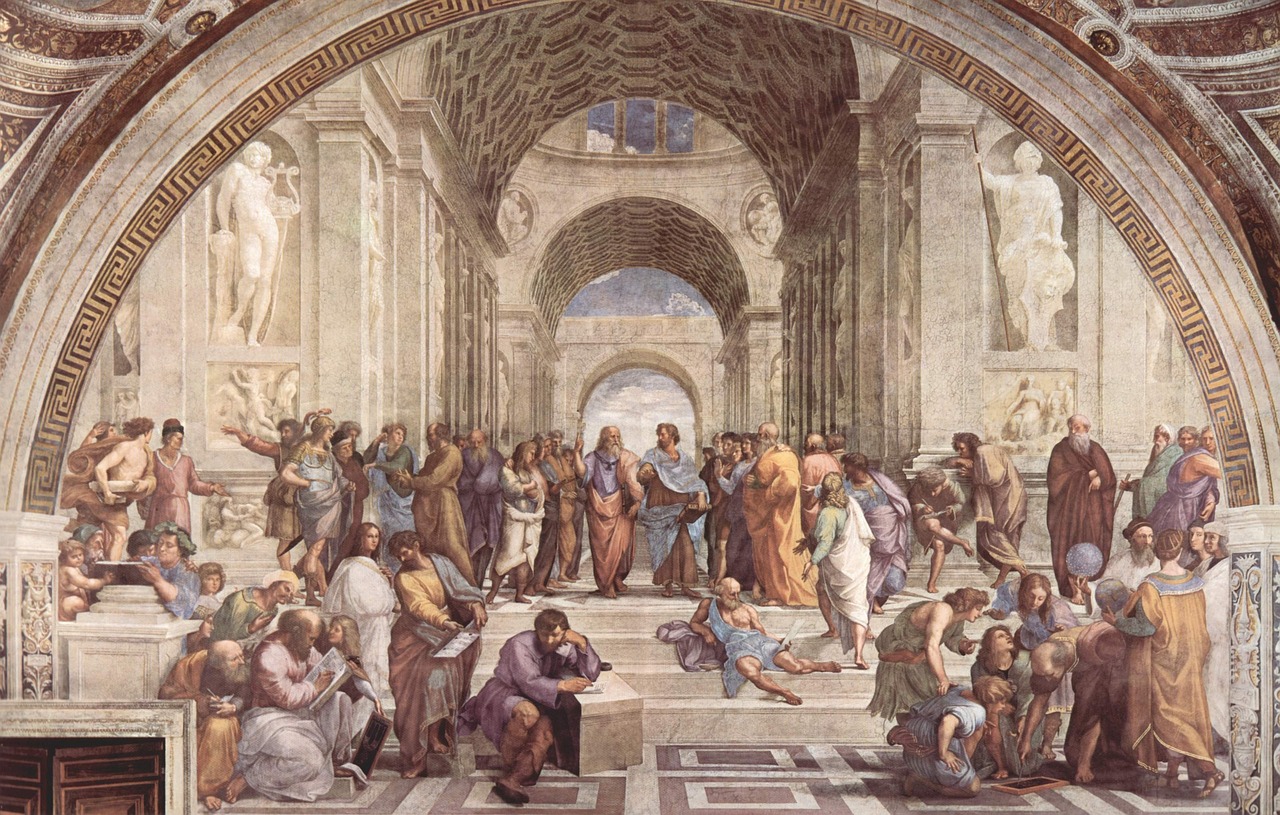
Nietzsche and Modern Political Movements
Friedrich Nietzsche's philosophical ideas are not just relics of the past; they resonate vibrantly within the fabric of modern political movements. His thoughts on power, morality, and the human condition have found their way into various ideologies, shaping contemporary discourse in ways that are both profound and sometimes controversial. As we delve into this relationship, it's essential to recognize that Nietzsche's work can be interpreted in many ways, often leading to divergent political applications.
One of the most striking aspects of Nietzsche's philosophy is the concept of the Übermensch or "Overman." This idea has been appropriated by various political movements, often leading to conflicting interpretations. On one hand, some have linked the Übermensch to notions of elitism and superiority, which can dangerously align with fascist ideologies. For instance, the idea that a select few are destined to lead or dominate over others can fuel authoritarian regimes. However, on the other hand, this concept can also inspire movements that advocate for personal empowerment and self-overcoming, encouraging individuals to transcend societal limitations and pursue their true potential.
Nietzsche's critique of traditional morality has also left a significant mark on modern political thought. His assertion that "God is dead" symbolizes a profound shift away from established moral frameworks, prompting a reevaluation of what constitutes right and wrong. This reevaluation can lead to revolutionary political movements that challenge the status quo. For example, contemporary social justice efforts often draw upon Nietzschean ideas to question and dismantle oppressive systems, arguing for a more inclusive and equitable society. In this sense, Nietzsche’s philosophy can serve as a catalyst for change, urging individuals to rethink inherited values and advocate for a more just world.
Moreover, Nietzsche's exploration of power dynamics is crucial in understanding modern political landscapes. His concept of the "will to power" suggests that human behavior is fundamentally driven by a desire for power and influence. This idea can be seen in various political contexts, from grassroots activism to global politics. For instance, movements that seek to redistribute power, such as environmental activism and anti-capitalist protests, reflect Nietzsche's insights into the nature of power and its implications for society. These movements often challenge existing hierarchies and advocate for a more equitable distribution of resources and opportunities.
In examining the connections between Nietzschean philosophy and modern political movements, it's vital to consider the duality of his influence. While some interpretations have led to the rise of authoritarian and exclusionary ideologies, others have fostered progressive movements that champion equality and justice. This complexity highlights the need for critical engagement with Nietzsche's work, encouraging individuals to draw upon his ideas while remaining vigilant against potential misinterpretations.
In conclusion, Nietzsche's philosophy continues to be a powerful force in shaping modern political thought. His ideas challenge us to confront our values, question authority, and seek personal and societal transformation. Whether through the lens of progressivism or authoritarianism, Nietzsche's influence is undeniable, urging us to navigate the intricate web of power, morality, and human potential in our contemporary world.
- How has Nietzsche influenced modern political thought?
Nietzsche's ideas on power, morality, and the Übermensch have been interpreted in various ways, influencing both authoritarian and progressive movements. - What is the significance of the concept of the Übermensch?
The Übermensch represents the idea of transcending societal limitations, which can inspire both elitist and empowering political ideologies. - How does Nietzsche's critique of morality impact political movements today?
His critique encourages a reevaluation of traditional values, leading to revolutionary movements that challenge oppressive systems. - Can Nietzschean philosophy be aligned with social justice efforts?
Yes, many contemporary social justice movements draw upon Nietzschean ideas to advocate for inclusion and equity.

Fascism and Nietzschean Influence
When we delve into the tumultuous waters of Fascism and its ideological roots, Nietzsche's philosophy often emerges as a point of contention. Many scholars argue that elements of Nietzsche's thought have been co-opted to justify authoritarian regimes and oppressive ideologies. However, this interpretation is not as straightforward as it may seem, and it raises significant questions about the misappropriation of philosophical ideas.
At the heart of this debate is the concept of the Übermensch, or "Overman," which Nietzsche envisioned as an individual who transcends the conventional moralities of society. Some fascist thinkers have seized upon this idea, interpreting it as a call for a superior race or elite ruling class. This distortion of Nietzsche's philosophy can be likened to a game of telephone, where the original message is altered beyond recognition as it passes through various interpretations.
Interestingly, Nietzsche himself was critical of nationalism and anti-Semitism, which are cornerstones of fascist ideology. He believed in the importance of individualism and the flourishing of personal potential, rather than the subjugation of the individual to the state or a collective identity. This contradiction highlights the danger of cherry-picking philosophical ideas to serve specific political agendas.
To better understand this complex relationship, consider the following table that outlines key aspects of Nietzsche's philosophy and their misinterpretations within fascist ideologies:
| Nietzschean Concept | Original Meaning | Fascist Misinterpretation |
|---|---|---|
| Übermensch | Individual who creates their own values | Superior race or elite ruling class |
| Will to Power | Drive for self-overcoming and creativity | Dominance and control over others |
| Nihilism | Recognition of the absence of inherent meaning | Justification for despair and violence |
It's crucial to recognize that Nietzsche's philosophy was not a blueprint for fascism but rather a critique of the very societal structures that fascism seeks to uphold. His disdain for herd mentality and blind obedience stands in stark contrast to the fascist ideal of a unified, unquestioning populace. Nietzsche championed the idea of the individual rising above societal constraints, which can be seen as a direct challenge to the authoritarianism inherent in fascist regimes.
Ultimately, the influence of Nietzsche on fascism is a complex and often misrepresented narrative. While some fascist leaders and thinkers have attempted to align themselves with Nietzschean ideas, the philosopher himself would likely have rejected their interpretations. This serves as a reminder of the importance of context and fidelity to original thought in political discourse.
- Did Nietzsche support fascism?
No, Nietzsche was critical of nationalism and anti-Semitism, which are core tenets of fascism. - What is the Übermensch?
The Übermensch is an individual who transcends traditional moral values, creating their own in the process. - How did fascists misinterpret Nietzsche's philosophy?
Fascists often distorted Nietzsche's ideas to justify superiority and dominance, contrary to his emphasis on individualism.

Progressivism and Nietzschean Thought
When we think about progressivism, it's easy to imagine a movement focused on social justice, equality, and the betterment of society. Surprisingly, many of these ideals can be traced back to the profound and often misunderstood philosophy of Friedrich Nietzsche. At first glance, Nietzsche might seem like an unlikely ally for progressives. After all, his concept of the Übermensch and the idea of the will to power can be interpreted in numerous ways. However, a deeper exploration reveals that Nietzsche's thoughts can indeed provide a robust framework for progressive thought.
One of the most significant aspects of Nietzsche's philosophy is his call for a reevaluation of values. He challenges the status quo and encourages individuals to question traditional moral frameworks. For progressives, this is a call to action. It invites us to scrutinize societal norms that perpetuate inequality and oppression. Nietzsche’s assertion that "God is dead" isn't merely a nihilistic proclamation; it signifies the opportunity to forge new values that align with our contemporary understanding of justice and human rights.
Moreover, Nietzsche's concept of the will to power can be viewed as a metaphor for the struggle for social change. This idea posits that individuals are driven by an intrinsic desire to assert and enhance their influence over their surroundings. For progressives, this translates into a passionate drive to dismantle oppressive systems and advocate for marginalized voices. It's about harnessing that energy to create a society where everyone can thrive, rather than just a privileged few.
Interestingly, Nietzsche's philosophy also emphasizes the importance of individuality and self-overcoming. This notion aligns closely with progressive ideals that champion personal freedom and self-expression. By encouraging individuals to transcend societal limitations, Nietzsche provides a philosophical underpinning for movements that advocate for LGBTQ+ rights, racial equality, and gender justice. The idea that each person can shape their destiny resonates deeply within these contexts, pushing for a more inclusive society.
To illustrate the compatibility of Nietzschean thought with progressive ideals, consider the following table that outlines some key concepts:
| Nietzschean Concept | Progressive Interpretation |
|---|---|
| Übermensch | A model for self-improvement and breaking free from societal constraints. |
| Will to Power | A drive to enact social change and empower marginalized communities. |
| Reevaluation of Values | The necessity to challenge and change outdated moral frameworks. |
| Individuality | The celebration of diverse identities and personal freedom. |
In essence, Nietzsche's philosophy can be a powerful tool for progressives. It encourages a critical examination of existing structures and inspires a relentless pursuit of a more equitable society. By embracing his ideas, we can foster a culture that not only accepts change but actively seeks it. The challenge lies in interpreting Nietzsche's work in a way that aligns with the values of compassion, inclusivity, and social justice. When we do that, we unlock a treasure trove of insights that can propel our progressive movements forward.
- How can Nietzsche's philosophy support social justice movements?
Nietzsche encourages questioning traditional values, which can help identify and dismantle oppressive systems. - Is Nietzsche's concept of the Übermensch compatible with progressive ideals?
Yes, it can represent the aspiration for self-improvement and breaking free from societal limitations. - What does the will to power mean in a progressive context?
It symbolizes the drive to enact social change and empower marginalized communities.
Frequently Asked Questions
- What are the core principles of Nietzschean philosophy?
Nietzschean philosophy revolves around key concepts like the will to power, which suggests that power is a fundamental driving force in human behavior, and eternal recurrence, a thought experiment that challenges individuals to live as if they would have to repeat their lives eternally. Additionally, the idea of the Übermensch or "Overman" represents the potential for humanity to transcend conventional morals and create new values.
- How does nihilism relate to political ideologies?
Nihilism, a prominent theme in Nietzsche's work, raises questions about the meaning and value of life, which can destabilize existing political ideologies. This questioning leads to a crisis of values, where traditional beliefs lose their hold, prompting a reevaluation of morals and potentially igniting revolutionary movements as societies seek to redefine their principles.
- What is the significance of the crisis of values in governance?
The crisis of values suggests that as traditional morals erode, political leaders and systems may struggle to maintain authority and legitimacy. This instability can lead to shifts in governance, as new ideologies emerge to fill the void left by outdated values, fostering a landscape ripe for change and innovation in political thought.
- How have Nietzsche's ideas influenced political leaders?
Nietzsche's philosophy has had a profound impact on various political leaders and movements, often being interpreted in ways that align with their agendas. For instance, while some have misappropriated his ideas to justify authoritarianism, others have found inspiration in his call for individual empowerment and the creation of new societal norms.
- In what ways does Nietzschean thought resonate with modern political movements?
Nietzschean philosophy continues to influence contemporary political movements, from fascism to progressivism. While some factions have twisted his ideas to support oppressive regimes, others leverage his thoughts on individualism and the reevaluation of morals to advocate for social justice and progressive change, showcasing the dual-edged nature of his philosophy.
- What are the connections between Nietzsche and fascism?
Some interpretations of Nietzsche's work have drawn controversial links to fascist ideologies, particularly in their emphasis on power and hierarchy. However, it's crucial to critically assess these connections, as Nietzsche himself opposed anti-Semitism and nationalism, suggesting that his philosophy is often misrepresented in these contexts.
- Can Nietzschean philosophy support progressive movements?
Absolutely! Nietzsche's ideas can align with progressive agendas by promoting the reevaluation of traditional morals and advocating for individual empowerment. His emphasis on creating new values allows for a more inclusive and just society, resonating with contemporary efforts toward social change and justice.


